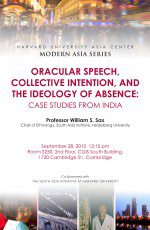Case Studies from India
 Professor William S. Sax, Chair of Ethnology, South Asia Institute, Heidelberg University
Professor William S. Sax, Chair of Ethnology, South Asia Institute, Heidelberg University
“Possession” by gods and spirits is often accompanied by an ideology of absence, according to which those “possessed” have no memory of what they experienced or said during their trance. Yet many aspects of such events seem to contradict this ideology: petitioners try to influence oracles before they go into trance, oracles’ statements while in trance appear to serve their own interests, the oracles directly or indirectly indicate that they can indeed remember what was said, etc. This leads to the question, “Who is really speaking when the oracle speaks?” I suggest an answer this question, based on ethnographic material from Rawain in the Central Himalayas. Here there is a well-developed system of “divine kingship” in which local gods rule small territories and solve disputes, partly by making authoritative statements through their oracles. I argue that in many cases, oracles are in fact articulating the collective intention of the communities they represent.
Co-sponsored with the Harvard University Asia Center
